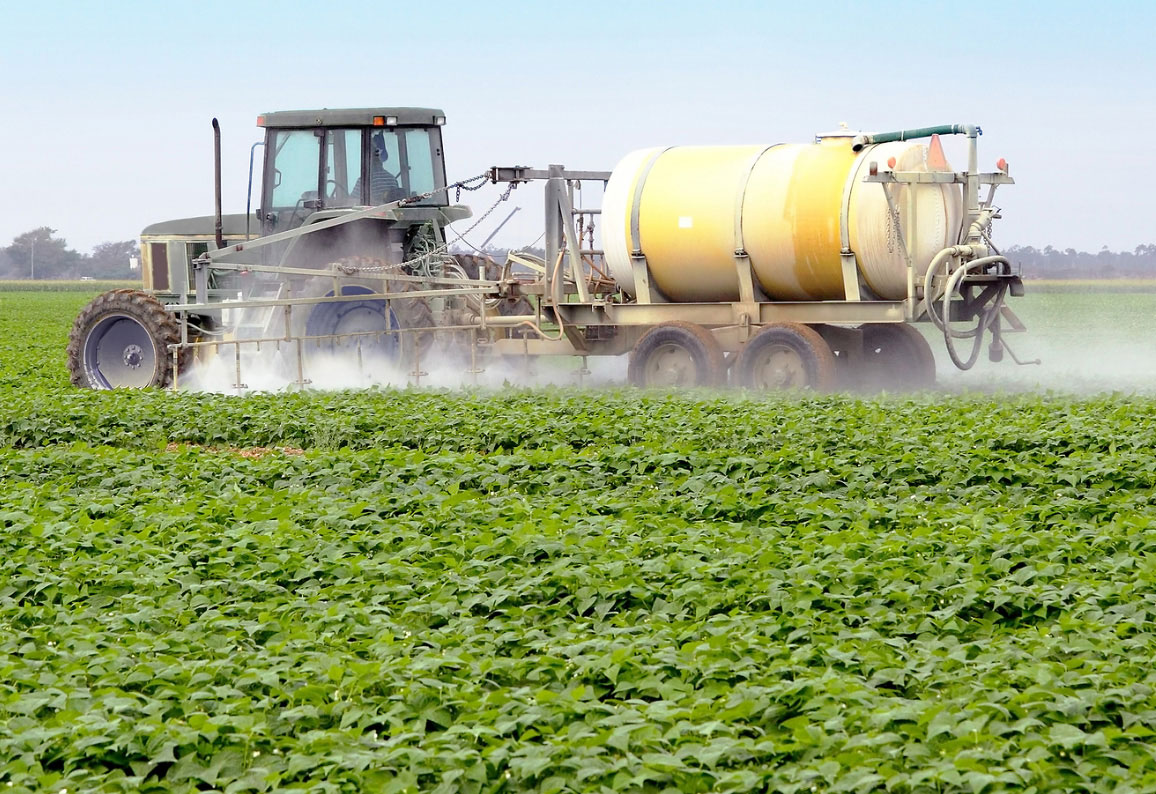Pesticides In Our Food - The Health Risk
Pesticides can have a cumulative toxic effect over time, and each person responds to this chemical build-up differently. The continual onslaught of chemicals from our environment (the food we eat, the water we drink, the air we breathe, the personal care and cosmetic products we use, the cleaning chemicals we clean our home with, the chemicals in plastics, the list goes on...) wears down the immune system and contributes to the development of chronic disease.
Journal of the |
But it is not only our bodies that suffer - biodiversity, wildlife, water quality, and the stability of our climate also suffers. These highly toxic poisons damage our ecosystems, and threaten the survival of many birds, fish, insects, and small aquatic organisms that form the basis of the food web. Each year, a massive chemical assault on our environment is launched by consumers and farmers as we use hundreds of millions of pounds of pesticide-active ingredients in our homes and gardens, and on crops.
Results from the Agricultural Health Study, an ongoing study of pesticide exposures in farm families, shows that farmers who use agricultural insecticides experience an increase in headaches, fatigue, insomnia, dizziness, hand tremors, and other neurological symptoms. Evidence suggests that children are particularly susceptible to adverse effects from exposure to pesticides, including neurodevelopmental effects.
When consumers become educated on the dangers of pesticides, they immediately ask, "why isn't the government protecting us and our food supply from these chemical contaminants?" and "why do chemicals in our food chain that are banned in other countries such as Europe fill the most popular refined foods on supermarket shelves?" Simply because the agricultural and biotech companies are very powerful, with powerful lobbyists who provide very large sums of money to government institutions. Whereas other countries such as New Zealand, Europe, and Japan take a precautionary approach, the US has an "innocent until proven guilty" approach towards chemical corporations until the damage has already been done.
Pesticides - Children & Pets At Serious Risk
Journal of the |
Both pets and children are especially susceptible to pesticides in the garden. Also at risk is the unborn fetus exposed to a diluted mixture of neurotoxins and endocrine disruptors in the womb, increasing the risks of neurodevelopmental disorders such as ADHD and autism, as well as other birth defects.
An infant's developing brain and body make them especially vulnerable to pesticide residues found on food. Pound for pound, they drink 2.5 times more water and eat 3-4 times more food. Studies have found that children with high pesticide exposures in the womb are at an increased risk of being born with birth defects. They also face developmental delays and are more likely to suffer from autism spectrum disorders.
Let's take a look at the health studies and statistics of just how dangerous pesticides are.
Read the Statistics
Pesticides have been directly linked to the rapid rise in various types of cancer (non-Hodgkin's lymphoma, prostate, brain, large intestine, and breast cancer), and neurological disorders such as Parkinson's disease. In children, they have been linked to soft tissue sarcoma, fetal death, neuroblastoma, leukemia, brain cancer, and autism. In pets, they have been linked to cancers such as canine malignant lymphoma.
The good news is that studies also show that within days of switching a child's diets from conventional food to organic fruits and vegetables, many pesticide metabolites become undetectable in their urine, and many of the pesticides are cleared from the child's body.
Organophosphates
Organophosphates are the basis of many insecticides and nerve agents. The EPA lists organophosphates as very acutely toxic to bees, wildlife, and humans.(12)
 There are approximately 40 organophosphate pesticides, and as a group, they account for half of the insecticides used in the US. The majority of organophosphates are used on food crops, but they are also used in and around the home to control termites, lawn insects, ants, cockroaches, fleas, ticks, and mosquitoes.
There are approximately 40 organophosphate pesticides, and as a group, they account for half of the insecticides used in the US. The majority of organophosphates are used on food crops, but they are also used in and around the home to control termites, lawn insects, ants, cockroaches, fleas, ticks, and mosquitoes.
Organophosphates kill insects and other animals by impacting the function of the central and peripheral nervous system. In large doses, organophosphates can also kill people and pets. Of greater concern, however, are studies on animals which show that even a single, low-level exposure to certain organophosphates during particular times of early brain development can cause permanent changes in brain chemistry, as well as changes in behavior such as hyperactivity. Research suggests that early childhood exposure which may not be immediately detected, can lead to long-term effects on learning, attention, behavior, and poses the threat of neurological damage. Similar responses were seen with lead, another environmental neurotoxin.(13)
Bee populations throughout the US are being devastated due to highly toxic bee-killing pesticides that have had a disastrous impact on food crops. Bees play a critical role in our food system. Nearly 1/3 of our crops - including vegetables, fruits, nuts, and seeds - depend on bees for pollination. Across the US, bee colonies are collapsing and scientists are pointing their finger squarely at pesticides as the cause.
Endocrine Disruptors
A class of chemicals called "endocrine disruptors" mimic the hormones in our bodies, or interfere with how our hormones function. They are found in many of the products we use on a daily basis, including plastics, food cans, garbage bin liners, detergents, cosmetics, and pesticides.
- Bisphenol A (BPA)
used in many household plastics and epoxy resins. Research with laboratory animals has shown that low-dose administration of BPA produces a wide spectrum of developmental and reproductive effects, including an increase in aggressive behavior, early onset of sexual maturation, changes in mammary gland development, and a decrease in testosterone levels and sperm production.(14)
- Pesticides
Even though endocrine disruptors in pesticides have been banned from commercial use, they still exist in our environment. DDT is an example of a pesticide that was used to control the spread of mosquitoes and other insects. Scientists at the Center for Research on Women’s and Children’s Health at the Public Health Institute in Berkeley, Calif. found that girls who were exposed to DDT before the age of 14 had a 5-fold increase in breast cancer risk as compared to those who were not exposed to the compound at this early stage of life.(15) - Phthalates
Used in many personal care products such as deodorants, shampoos, hair sprays, nail polish, etc. Investigators have reported that prenatal exposure to phthalates can significantly reduce masculine behavior in boys.(16)
How About Scrubbing & Washing Food?
Unfortunately, when it comes to pesticides, washing and scrubbing foods will help very little. Produce is made to withstand farm irrigation during growing, so it can withstand simply rinsing in the sink. Some pesticides, e.g. imidacloprid, are “systemic,” meaning they are absorbed by the root system of the plant and distributed throughout the entire organism, so no amount of washing or peeling will remove them. This class of pesticides has been on the rise for the last 15 years, and now represents a new, unstudied, and unregulated risk.
 Genetically engineered crops like BT corn are engineered to produce their own internal insecticide, therefore it is part of the plant DNA (the EPA officially labels GMO corn as a pesticide for this reason). The average ear of corn grown in the US has 3 different systemic insecticides within it. This corn is the backbone of the new "chemicalized" US food system, used in farm animal feed, high-fructose corn syrup, and in thousands of processed food products.
Genetically engineered crops like BT corn are engineered to produce their own internal insecticide, therefore it is part of the plant DNA (the EPA officially labels GMO corn as a pesticide for this reason). The average ear of corn grown in the US has 3 different systemic insecticides within it. This corn is the backbone of the new "chemicalized" US food system, used in farm animal feed, high-fructose corn syrup, and in thousands of processed food products.
Tips to avoid pesticides on your food:
- The only way to avoid them completely is to buy organic, buy from a farm that you know does not use pesticides, or grow your own.
- If you buy non-organic produce, keep a spray bottle of white vinegar next to your sink and spray fruits and veggies liberally, before rinsing. This can help remove the pesticides on the outside of the skins.
- There are specific fruits and vegetables that contain much higher pesticide residue than others. View the updated list and choose organic produce for the worst offenders.
Produce with the most vs. least pesticides...
RELATED ARTICLES
- The Dirty Dozen: What they are & why you should avoid them
- Pesticides & Herbicides
- Health dangers of foods sprayed with pesticides
- Organic living
- The benefits of going organic
- Foods with the most vs. least pesticides
- Irradiated foods
- Understanding GMOs
- Additives & chemicals in our food
- What are processed & refined foods
- Food safety & China
- Get off the diet merry-go-round
- Raising children naturally
- Healthy food choices for pets
- The FDA: Failure to protect human & pet food




 Learn more about building your own non-toxic cleaning cabinet:
Learn more about building your own non-toxic cleaning cabinet: